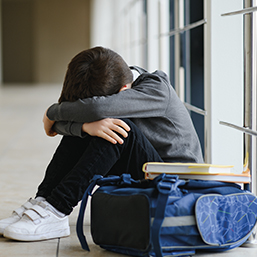
Over the last seven years, I’ve had the privilege of supporting children on the autism spectrum and their families – first as a behavioral aide, and now as a budding child psychologist. I’ve worked in classrooms, kitchens, sensory gyms, and therapy offices, and I’ve seen firsthand just how complex a child’s relationship with school can be. While some children run toward the schoolyard with curiosity and confidence, others face mornings full of dread, anxiety, and emotional overwhelm.
\n \nFor many parents, it’s tough to know what’s “just a phase” and what signals a deeper issue. It’s not uncommon for children to say they don’t want to go to school, especially after weekends, holidays, or big transitions. But when this aversion becomes a daily pattern or starts to interfere with a child’s functioning and well-being, it deserves a closer look.
\nWhen is it normal not to like school?
\nSchool is a complex social and emotional environment. It challenges kids academically, tests their social confidence, and pushes them to regulate emotions, follow rules, and tolerate discomfort – all in one day. So, it's no surprise that many children occasionally complain about going.
\nYounger children especially may experience what's known as transitional resistance – difficulty moving from one environment (home) to another (school), even if they ultimately enjoy the classroom once they're there. This can be a totally developmentally appropriate response to change or fatigue. It becomes less concerning when:
\nIn these cases, reassurance, structure, and gentle encouragement usually help kids re-engage.
\nBut what if it’s something more?
\nAs a counsellor, my curiosity is piqued when avoidance starts to look more entrenched. We might see prolonged morning meltdowns, physical complaints like stomach aches or headaches, or outright refusal to leave the house. Parents might notice anxiety building the night before school or children expressing fear about specific people or activities at school. In some cases, a child who once enjoyed learning begins to withdraw socially or fall behind academically.
\nThis kind of persistent school avoidance is not about laziness or manipulation. It's a stress response – a nervous system stuck in survival mode. In psychology, we refer to this as school refusal behavior, and it’s often linked to deeper emotional, social, or sensory challenges. For neurodivergent kids or those with anxiety, ADHD, trauma histories, or learning differences, school can present more hurdles than their nervous systems are equipped to handle without support.
\nSometimes, the child can't quite articulate what's wrong – only that school doesn’t feel good. And that’s okay. Avoidance is communication. Our job as caregivers, educators, and therapists is to listen to the behavior and help decode it.
\nA compassionate approach: Empathy before strategy
\nBefore diving into interventions, we start with attunement. Ask yourself: What might be beneath the surface of this resistance? What is my child experiencing emotionally, physiologically, or socially that might be making school feel unsafe or unmanageable?
\nRather than jumping to problem-solving, it helps to meet the child with calm curiosity. Statements like, “It seems like something about school is feeling really tough right now,” invite connection and reduce shame. We want the child to feel seen – not pressured. From a therapeutic standpoint, this approach supports co-regulation, which is essential before a child can access logical problem-solving or verbal processing.
\nOnce a child feels emotionally held, we can begin to gently scaffold their return to school. This might involve working closely with teachers and support staff to create gradual exposure plans, implement sensory accommodations, or ensure predictable routines. For many children, particularly those with anxiety or trauma histories, predictability equals safety.
\nStrategies that work – backed by psychological science
\nThrough both practice and research, we know that the following approaches help reduce school-related distress and improve engagement:
\nWhen to seek extra support
\nIf school resistance is persistent, worsening, or interfering with your child’s emotional well-being, therapy may be helpful. As a clinician, I often work with children to identify the root causes of their distress and help them develop the coping skills and self-understanding they need to re-engage. Through approaches like Cognitive-Behavioral Therapy (CBT) or Play Therapy, we help children examine the thoughts fueling their anxiety and gently challenge unhelpful beliefs like “I can’t do it,” or “Something bad will happen if I go.”
\nFamily therapy or parent consultation can also be transformative. Many caregivers feel stuck between empathy and the pressure to enforce attendance. Having a professional in your corner – someone who understands both the psychological and practical pieces – can provide clarity and relief.
\nIn closing: Trust the signal
\nIf your child is struggling with school, you are not alone – and neither are they. These behaviors are often signals, not symptoms of failure. With patience, empathy, and a trauma-informed lens, we can support our children in feeling safe, capable, and curious again.
\nSchool avoidance doesn’t mean your child isn’t resilient. It often means they’re overwhelmed and trying to protect themselves the only way they know how. Our job isn’t to push them through that wall – it’s to gently, strategically walk with them until they’re ready to climb it on their own.
\n\n
Hannah is a counsellor at Innerlogue Therapy & Psychology. She provides counselling intervention for neurodiverse children, adults, and families. Hannah offers counselling sessions at Innerlogue’s Kensington location.
\n\n
See our related articles:
\nCalgary’s Child Magazine © 2025 Calgary’s Child